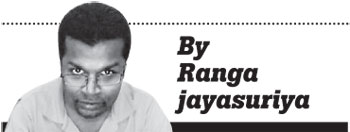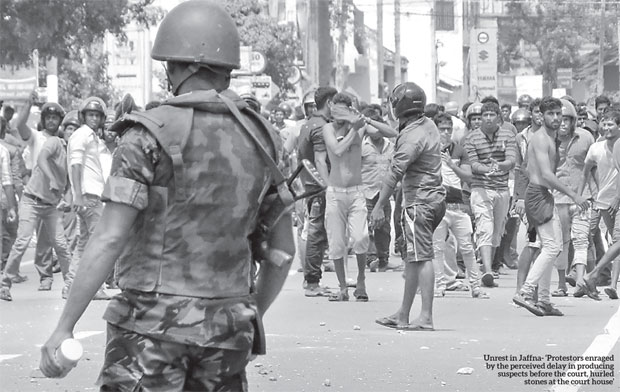 What serves the long term peace and security in Sri Lanka: high-handed national security state of the former regime or more nuanced judicial approach of its successor?
What serves the long term peace and security in Sri Lanka: high-handed national security state of the former regime or more nuanced judicial approach of its successor?
The contrast of these two approaches was in display last two weeks after the tragic rape and murder of an 18-year-old student in the Punguduthivu island, Jaffna. Protestors enraged by the perceived delay in producing suspects before the court, hurled stones at the court house. 130 protestors were arrested and later remanded. Under the previous regime, those would be rioters would not dare take to the streets. And if they ever did, ‘justice’ could more likely have been meted out by white vans.
The fundamental difference between the incumbent administration and its predecessor in the north is at least partial restoration of the rule of law in the region.
Then President Maithripala Sirisena made an unannounced visit to the peninsula and met the parents of the victim. After a day of protests, Jaffna town returned to normalcy. And that normality was achieved not by the use of brute force.
There are two ways to maintain order in a post- conflict society: the enlightened democratic method is slow moving, and calls for restoration of civil liberties, including the freedom of assembly and freedom of expression, civilian rule and rule of law, while the military progressively relegates itself from civil life. The other method is to maintain peace by the use of terror and coercive organs of the state, and by extension, any means necessary.
 Both models work and, at least, serve the fundamental security concerns of the rulers. The Russians pacified Chechnya and handed it to a Putin crony (And a warlord), who has since then been running the province with an iron fist. We have not seen terrorism of the scale of Beslan or the Moscow theatre siege since then. In that sense, it serves the security concerns of the larger Russian state. Whether Chechans are rotting in the hell is a secondary question.
Both models work and, at least, serve the fundamental security concerns of the rulers. The Russians pacified Chechnya and handed it to a Putin crony (And a warlord), who has since then been running the province with an iron fist. We have not seen terrorism of the scale of Beslan or the Moscow theatre siege since then. In that sense, it serves the security concerns of the larger Russian state. Whether Chechans are rotting in the hell is a secondary question.
In the same way, since the defeat of the LTTE, the former regime kept the former warzone under a tight military grip. Tamils were unhappy, but, that strategy kept the separatist tendencies of some members of the community in check.
Though one would argue a heavy degree of discontent would push a community towards violence that was only partially true. Grievances and intent need to find means and space in order to a violent struggle to become a reality. The Rajapaksa regime denied the latter two attributes to the fringe elements of the Tamil community. On the contrary, in the 70s and 80s, Tamil youth took up arms with relatively less grievances (while Jaffna was then the second richest city in the country) because the means and scope for organisation were abundantly available, partly due to poorly trained ceremonial military.
We could have followed the Rajapaksa method for decades and kept terrorists at bay (As long as that did not elicit an international intervention that weakens the writ of the State). Jaffna would remain an unhappy place, however, the greater danger is that terror employed in the North can easily be emulated in the South, which we witnessed lately in the form of white van abductions and extra judicial killings such as the Welikada prison massacre.
In that sense, democracy in the South is intrinsically linked to the democracy in the North. In fact, it was a spiral effect of terrorism in the North and resultant counter- terrorism operations that resulted in erosion of our liberties in the South.
Vice versa, when democracy is restored in the South, it would have its spin offs in the North. The new found sense of freedom in Jaffna is a case in point. The ex- president Mahinda Rajapaksa says he fears revival of the LTTE, referring to the protest in Jaffna.
He made those remarks in another visit to canvass support for his political come back, this time in Anuradhapura. It is natural that when authoritarian systems loosen their grip, people begin expressing their grievances freely. However, this transformation should be gradual and handled carefully. Authoritarian systems such as the communist empire in the Soviet Union and Eastern Europe or in a different circumstance, the Indonesian controlled former East Timor, which tried to reform and instil a greater degree of freedom collapsed when the authorities lost control of the process.
However, that after a day of spontaneous protest by a few hundred, Jaffna returned to normal suggests that the Tamil polity as a whole is conducting themselves responsibly. Also, there is of course little political capital to be made by Tamil politicians out of the incident since all suspects happened to be Tamil.
In order to maintain peace in Jaffna, Gotabaya Rajapaksa built a national security state there. That strategy which showed little attention to Tamil sensitivities and grievances turned Jaffna into an unhappy place of simmering discontent. Many would have worried that discontent would explode into a mass upheaval when the new administration gradually loosen the grip. That it did not happen may suggest that people there have civic abilities (Despite that many of them being zombified by the LTTE’s virulent ideology in the past.)
Later, Gotabhaya’s security state gradually expanded its tentacles to the South. He turned us into an unhappy and insecure people, who lived in fear of the arbitrary powers of our own elected government. Our concerns were more intimate to us than the grievances of the North. However, they are an extension of a strategy that he experimented and later entrenched in the North. His elder brother, Mahinda Rajapaksa elevated himself as the absolute ruler of that security state and dismantled the last remnants of independent institutions. A regime that uses terror to maintain its reign over one particular community would not hesitate to do it against others. We lived at the mercy of Rajapaksa’s security state which he built to keep ‘peace’ in Jaffna.
Now that the new administration is dismantling that security state, it has to cope with enthusiastic backers of that militaristic strategy and the fringe elements of the Tamil community who could exploit new freedoms to advance their maximalist agenda.
These two groups are mutually propelling each other’s agenda. For people in Jaffna, it is in their long term interest to rein their own Weerawansas. Moderate Tamil leaders should come to grips with the limits that the new government can go, without upsetting the apple cart in the South and playing into the hands of the ultra-nationalist detractors there.
Jaffna has an abundance of grievances, many of which are by-products of a violent struggle waged by a maximalist terrorist group and military strategies that were used to defeat that terrorist group. The grievances of that painful legacy should be addressed, however , that cannot be done overnight. And rushing that process, may not lead to the intended outcome either, rather creating further problems both in the South and the North.
The government should democratize its apparatus at the Centre (Perhaps including teaching cops how they should speak to the public in a civilised manner). Positive spin off would trickle down to the North and the South. Only a democratic South can help democratise the North.